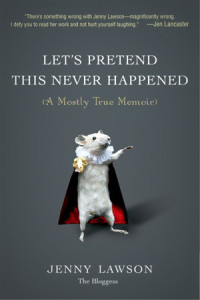I have been in therapy for over a decade now. I have tried a variety of medications and experienced a variety of diagnoses—mostly with the same theme: depression, anxiety, obsessive-depressive, obsessive-compulsive like symptoms, and so on. The Bloggess Jenny Lawson has depression, severe anxiety, avoidant personality disorder, occasional depersonalization disorder, self-harm issues, OCD, and trichotillomania.
variety of diagnoses—mostly with the same theme: depression, anxiety, obsessive-depressive, obsessive-compulsive like symptoms, and so on. The Bloggess Jenny Lawson has depression, severe anxiety, avoidant personality disorder, occasional depersonalization disorder, self-harm issues, OCD, and trichotillomania.
If this were a contest, Lawson is clearly winning. But it is, of course, not a contest. Because living with a myriad of mental illnesses (as they seem to like traveling in packs) can be devastating. Fortunately, Jenny Lawson has made it a little less devastating with her first memoir, Let’s Pretend this Never Happened and her most recent memoir, Furiously Happy: A Funny Book About Horrible Things.
In Let’s Pretend This Never Happened, Lawson explores the early stages of her mental illnesses, as well as her quirky childhood growing up in rural West Texas. For some more obvious reasons, I see my own experience in Lawson’s: explaining to people not from the South that gun cabinets are furniture specifically for guns, telling the many stories of when your mom went on a murderous rampage for a rattlesnake (that sometimes turned out to be a bull snake instead, which leads to the inevitable regret), or, “Yes, that’s a bobcat. Her name is Cassie.” But outside of growing up in the rural parts of Texas, Lawson’s story resonates because she was the kid who thinks “too much” in a place where intellectualism is frowned upon or at the very least incites suspicion. (Seriously, how can someone think too much, and surely that can’t be worse than thinking too little?!)
 However, this sort of thinking “too much” isn’t limited to highfalutin’ intellectualism. Lawson’s prose, much like her thoughts, meander and wander in a stream of conscious, rambling prose that is creative and infectious, and for me, completely relatable. Let’s Pretend This Never Happened delights in the absurdity of how our brains work, ones afflicted by mental illness or not, and it is this delight that eventually sets the stage for Furiously Happy.
However, this sort of thinking “too much” isn’t limited to highfalutin’ intellectualism. Lawson’s prose, much like her thoughts, meander and wander in a stream of conscious, rambling prose that is creative and infectious, and for me, completely relatable. Let’s Pretend This Never Happened delights in the absurdity of how our brains work, ones afflicted by mental illness or not, and it is this delight that eventually sets the stage for Furiously Happy.
Released this past September, Furiously Happy is not as searingly funny as Lawson’s first memoir, but it is certainly more insightful. While Let’s Pretend this Never Happened sometimes veers into everyone-look-at-the-“freak” territory, Furiously Happy often turns poignant as Lawson mediates on living with mental illness, all without losing the quirk of her first memoir. This is due in large part to the clearer purpose of Furiously Happy which is based on Lawson’s premise that:
“I’ve often thought that people with severe depression have developed such a well for experiencing extreme emotion that they might be able to experience extreme joy in a way that ‘normal’ people also might never understand…”
In this way, Furiously Happy is brave, like really brave, and with Lawson’s writing style, that bravery leaps right out from the pages and infects the reader’s mad little heart. There’s freedom and catharsis within the tragi-comic frame Lawson provides in her memoir. It gives me the allowance for living with and working through my own mental illness (or just, you know, being human). For example:
- Shutting your office door and hiding under the desk for a little while is totally acceptable.
- No one gives awards for “Outstanding Achievement in Getting Through a Day Without Screaming.” If ever I work for myself, I plan to have my own employee awards where my pets will be the audience as I give thank you speeches for winning awards like “Outstanding Daydreaming.”
- On that note, self-love is one of the hardest things. Everyone should get an award for self-love.
- Laughing at inopportune moments is a great survival mechanism.
- Some days, you just can’t. That’s okay.
- People who don’t want to deal with unhappy or “uncomfortable” feelings are in denial, not “normal.”
- People may accuse you of being anti-social, but you can simply explain to them that actually you were just hanging out with your pets instead. Then you can accuse them of being speciesist. How you like them apples?!
- Pure spite is one of the best emotions for overcoming shame.
- If you are in public and quack at some ducks you see, just roll with it. People who grew out of the these-are-the-sounds-an-animal-makes phase of their life aren’t better at adulting than you, they’re just boring.
- You don’t have to explain yourself to anyone (but you probably will anyway).
Some of these items may seem pithy, but the most important thing I get out of reading Jenny Lawson’s books are an affirmation of radical self-acceptance. Her books (and blog) are a space where mental illness is real and tangible, and, because it’s real, it is something you have to learn to live with, not necessarily overcome. After I read her books or her blog, I feel an allowance to be sillier, weirder, to let free the many wandering, unexpressed thoughts in my head without shame or fear.

